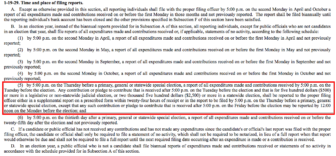 An omission in state law appears to allow wealthy individuals and big corporations to keep secret large amounts of last-minute money they dump into county commission races until an election is over, New Mexico’s state elections director confirmed Friday.
An omission in state law appears to allow wealthy individuals and big corporations to keep secret large amounts of last-minute money they dump into county commission races until an election is over, New Mexico’s state elections director confirmed Friday.
That makes the state’s campaign finance law inconsistent on when to require candidates or PACs to disclose large monetary contributions. Currently, in races for the state legislature and non-statewide judgeships, a contribution over a certain threshold that arrives in the last week must be reported within 24 hours.
That is not the case in races for New Mexico’s 33 county commissions.
The current law “has holes in it. It has inconsistencies. Some people report; and some people don’t. There’s a lot of ambiguity. We would love campaign finance reform,” state elections director Kari Fresquez acknowledged Friday.
The discovery of the apparent loophole came in response to an ethics complaint filed by Adrian Pedroza, who lost a Bernalillo County Commission race to Steven Michael Quezada by fewer than 340 votes out of 10,816.
Fresquez confirmed her analysis of the law in an interview Friday with NMID, although her office has not made a final determination on the issue or Pedroza’s complaint, she said.
Pedroza alleged in his ethics complaint that New Mexicans for New Mexico – a political action committee — violated state law by not reporting within 24 hours each of three contributions that totaled $34,000 it had received in the last week before the election. Most of that money came from the developer of a controversial proposed development on Albuquerque’s west mesa – called Santolina – that Pedroza opposes.
According to Fresquez, however, the 24-hour rule applies only to legislative and non-statewide judicial races, not county commission contests.
Had it been a race for the New Mexico House of Representatives or state Senate or for a local judgeship the PAC would have had to report each of the contributions a day after they received them. But as the campaign finance law is written, any contributions that came in for a county commission race after May 31 didn’t have to be publicly disclosed until 30 days after the election when the PAC reported them.
Pedroza said he was disappointed when NMID told him County Commission races appear not to be included in the 24 hour disclosure rule.
“These loopholes just allow for big money to unfairly influence elections and we owe it to voters to close these loopholes,” Pedroza said.
The loophole is another example of the ambiguity in state law that governs how candidates, campaign and political committees finance elections in New Mexico. Over the last decade, critics and good-government advocates have repeatedly pushed state lawmakers to update the law, to clean out the uncertainties and inconsistencies, but with little success.
The ability of a political action committee with ample resources like New Mexicans for New Mexico to not publicly disclose its receipt of sizable contributions in the final days of the race put him at a disadvantage, Pedroza said. He couldn’t respond to allegations contained in attack ads and mailers at the same time his campaign couldn’t tell voters who was behind the efforts.
A review of the political action committee’s reports show Santolina’s developer, Western Albuquerque Land Holdings LLC, gave New Mexicans for New Mexico $22,839 on June 1 and an in-kind contribution of $10,000 on June 2.
Roberto Ramirez of Albuquerque gave $2,000 on June 2, according to the report.
The PAC bought billboards, hired canvassers, sent mailers and used robocalls to support Quesada and another candidate for the seat while criticizing Pedroza.
Viki Harrison, executive director of Common Cause New Mexico, wondered if officials “left out the county races (in the law) because no one ever did this before.”
The loophole is only the latest inconsistency or ambiguity in the law to surface.
Earlier this year, a state Senate candidate didn’t disclose who paid for campaign literature prior to the June 7 primary. He said he had relied on a nearly 20-year-old state attorney general’s advisory opinion to say his lack of disclosure is legal.
The decision to send two mailers without disclosure highlights an ambiguity in the law: Candidates are required by law to disclose such information, but a 1997 opinion makes that law unenforceable, according to the Secretary of State’s office.
Harrison said state lawmakers need to update the state’s campaign finance law during the 2017 legislative session because court rulings in the past two decades have struck down much of New Mexico’s campaign finance law, making much of it unenforceable.
Also the law doesn’t contemplate the new ways that people and organizations can contribute money that have arisen in the wake of recent Supreme Court rulings, she said.
“The Secretary of State is absolutely correct,” Harrison said. “There are glaring holes in the law.”
The county commission loophole, she said, is a “perfect example of why we need this reform and why people need to get this passed,” she said.
All these efforts coordinated by developers who want a vote of the Mayor’s sterile pie. We must stop this unbridled development. Punto.